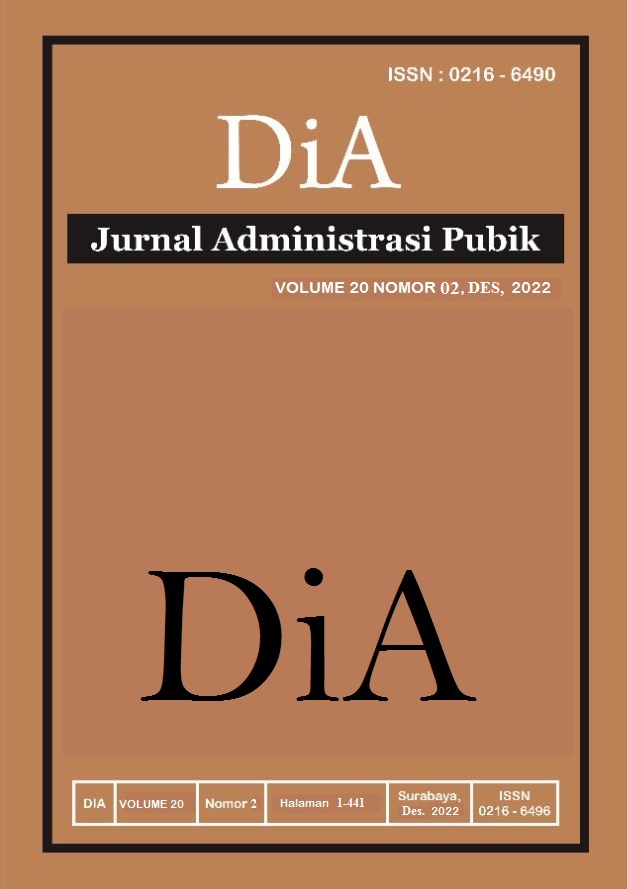ANALYSIS OF THE NEED FOR LABOR MIGRATION POLICY IN SINGAPORE
DOI:
https://doi.org/10.30996/dia.v20i02.6655Keywords:
Singapore, Migration, Industry, Labour, PolicyAbstract
Singapore is categorized as a Developed Country because of its developed trading industry among Southeast Asian countries. The existence of Singapore is inseparable from the presence of residents. As is known, most residents of Singapore are the result of migration policies due to the lack of population. Singapura recorded a record decline in people over the past year. The government's annual brief report revealed that the restrictions and conditions of the Covid-19 pandemic were one of the leading causes. Singaporean population also fell 0.7% to 3.5 million, while permanent residents (PR) fell 6.2% to 0.49 million. This is the first drop from YoY, both in population and population since data was collected in 1970. Migration is the movement of people from one area to another aimed at living sedentary, which goes beyond the administrative/political boundaries. The move made by a resident is usually immigrant because he has the desire to live a sedentary life for a long time. This research uses a qualitative descriptive method with literature review research. The results showed that one of the factors driving migration from Indonesia to Singapore was the lack of labor in Singapore. The process of self-formation into a Singaporean identity through migration, adaptation, and integration stages. Singapore has a policy toward migrant workers. The policy is specifically related to skills and age. If workers’ skills do not meet the criteria, the Government applies a policy to upgrade skills by conducting certified training. The Basic Skill Certificate (BSC) and Skill Evaluation Certificate (SEC) have been implemented since 1998.
Downloads
References
Arafat, B. A. P., & Taniady, V. (2021). Fulfillment of the Poor's Right to Decent Housing and Settlements in Urban Indonesia: A Comparative Study of Singapore and Australia. Jurist-Diction, 4(2), 559. https://doi.org/10.20473/jd.v4i2.25753
Chiyin Shim. (2011). The Long Way Home. http://www.ilo.org/wcmsp5/groups/public/---asia/---ro-bangkok/---ilo-jakarta/documents/publication/wcms_747570.pdf
Darmastuti, S., Juned, M., Susanto, F. A., & Al-Husin, R. N. (2021). COVID-19 and Policies in Responding to Economic Recession: A Case Study of Indonesia, the Philippines, and Singapore. Journal of Madani: Science, Technology, And Humanities, 4(1), 70–86. https://doi.org/10.33753/madani.v4i1.148
Dewi, S., Listyowati, D., & Napitupulu, B. E. (n.d.). THE ECONOMIC IMPACT OF MIGRATION: THE CASE IN INDONESIA.
Fernandi, M. F., & Suharso. (2020). Three-Wave Migration: Traces of Wong CilikKlaten in SIngapura in 1920-1980.
Muhtarom, A., Syairozi, M. I., & Yonita, H. L. (2022). Analisis Persepsi Harga, Lokasi, Fasilitas, dan Kualitas Pelayanan terhadap Loyalitas Pelanggan Dimediasi Keputusan Pembelian (Studi Kasus pada Umkm Skck (Stasiun Kuliner Canditunggal Kalitengah) Metode Structural Equation Modelling (SEM)-Partial Least. EKOMBIS REVIEW: Jurnal Ilmiah Ekonomi dan Bisnis, 10(S1), 391-402.
Pengampu, D., Al Haris, : M, Si, M., & By, D. (2021). Singapore State Demographics Paper.
Rahman, A., Satispi, E., & Adiyasha, D. L. (2020). Comparison of E-Government Between Singapore And Japan: Perspectives On Determinants And Their Role In Streamlining Government And Controlling Corruption Public Administration Study Program, Muhammadiyah University Jakarta, Indonesia Administr Study Program. Collaboration : Journal of Public Administration, 6(2), 177–199.
Ridwan, M., Ulum, B., Muhammad, F., Indragiri, I., & Sulthan Thaha Saifuddin Jambi, U. (n.d.). The Importance Of Application Of Literature Review In Scientific Research. http://journal.fdi.or.id/index.php/jmas/article/view/356
ANWAR, S., & YUANGGA, K. D. (2019). Economic Growth In Singapore Since The Establishment Of The Monetary Authority Of Singapore. EDUKA : Journal of Education, Law, And Business, 4(1). https://doi.org/10.32493/eduka.v4i1.3825
Ponggohong, B. W. T., Niode, B., & Tulung, T. (2018). Indonesia's Cooperation with Singapore in the Protection of Indonesian Migrant Workers (PMI) in Singapore. Politico Journal, 7(4), 1–12.
Rahman, M. (2012). Migration policy in Singapore. https://www.researchgate.net/publication/283826435
Downloads
Published
How to Cite
Issue
Section
License
The DiA journal allows authors to retain the copyright of their papers without limitation. Authors may grant publishers non-exclusive publishing rights to publish articles. Granting first publishing rights to publishers also qualifies as unlimited copyright (because there are no restrictions imposed by publishers on author copyright).







